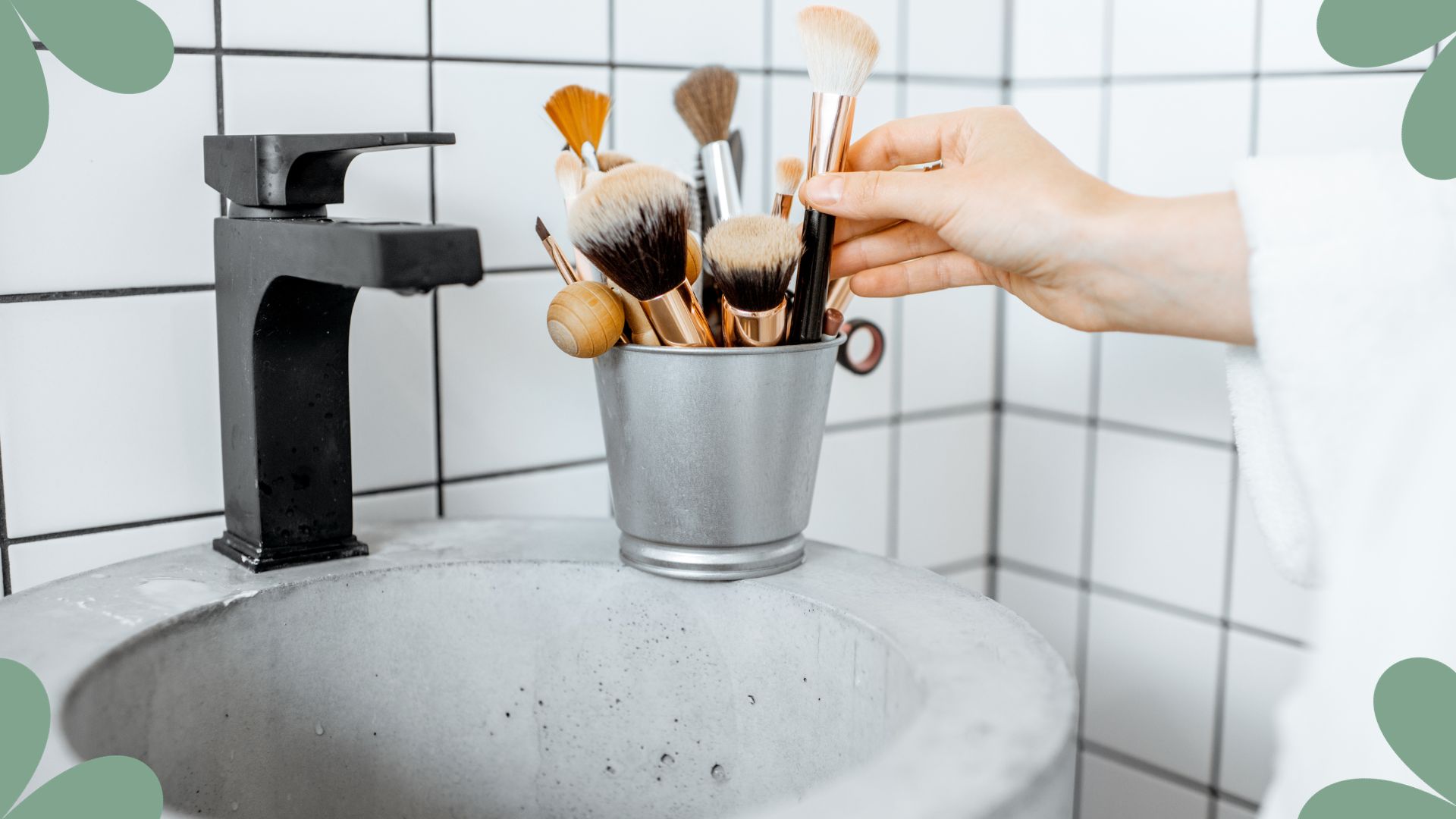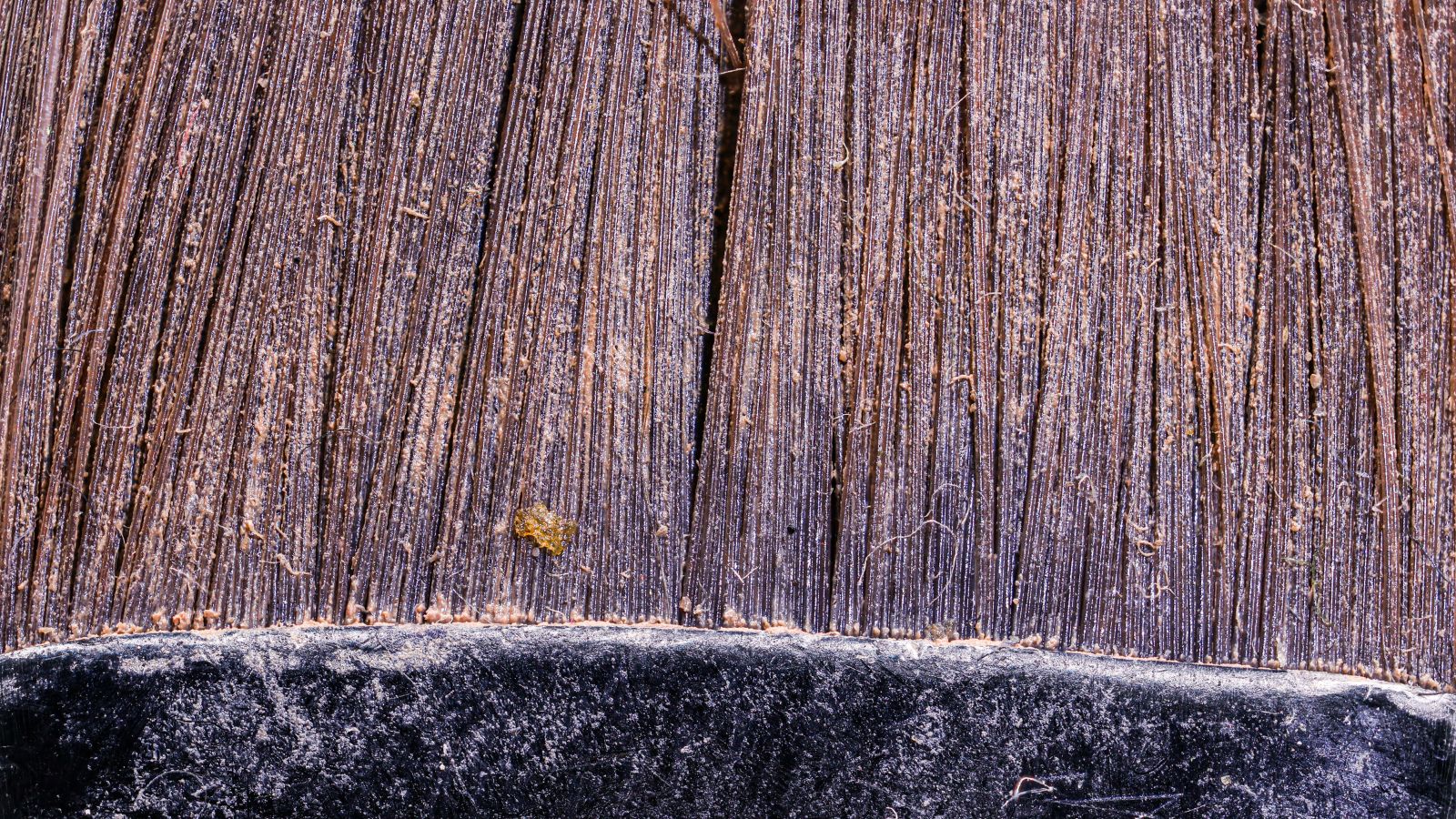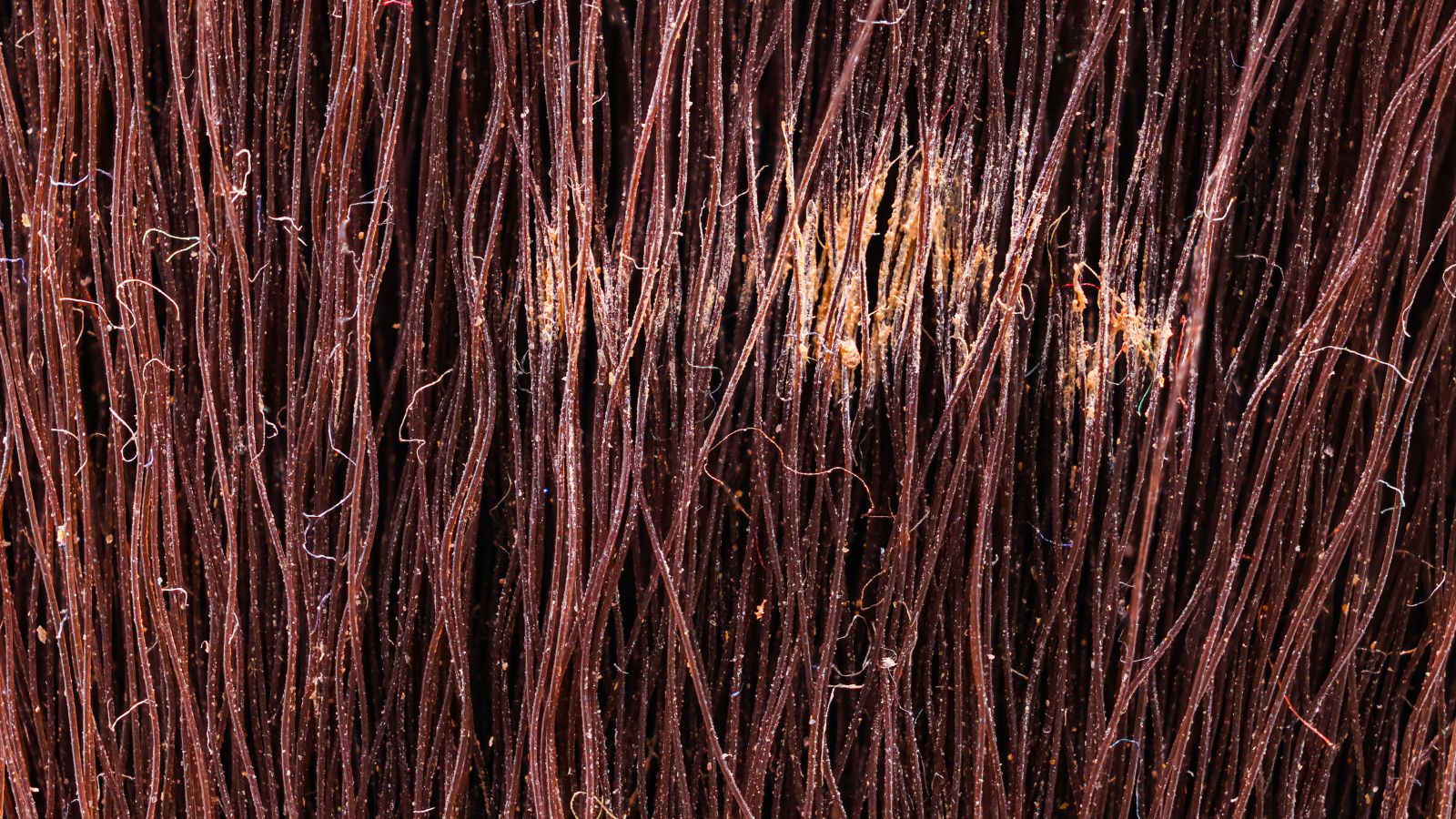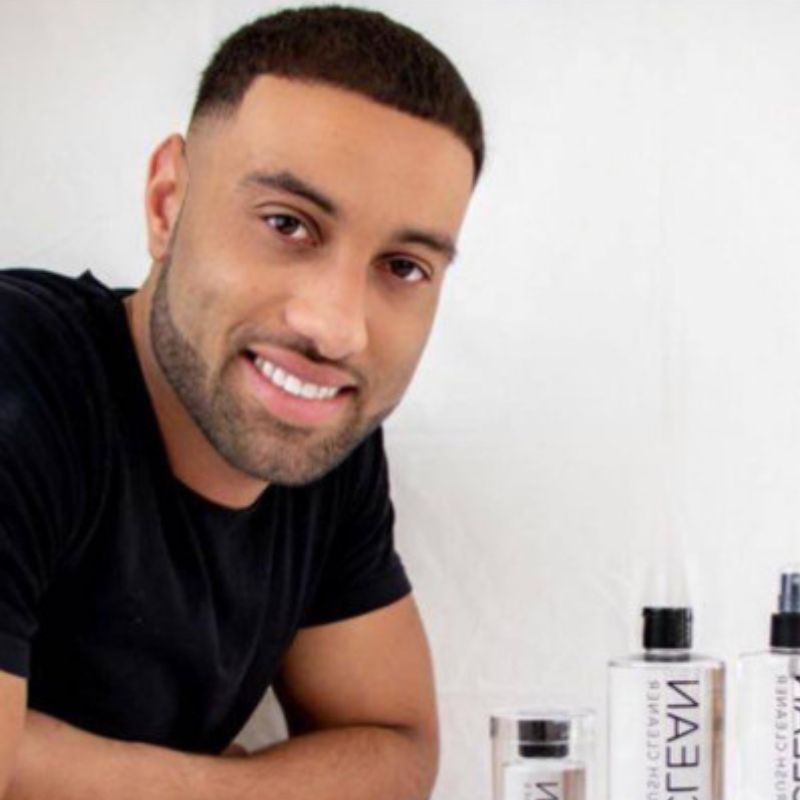This is exactly how often to wash your makeup brushes
Knowing how often to wash your makeup brushes will keep your complexion happy, and help your tools last as long as possible.


Be honest, do you really know how often to wash your makeup brushes? A bit like clearing out the fridge and changing your phone contract, cleaning our makeup brushes is one of those things that feature high on our to-do lists but we rarely actually do.
If you’re feeling immediately guilty reading this, don’t, as you’re certainly not the only one dodging the task of washing your best foundation brushes and other best makeup brushes. According to a survey from Beauty Pie, one in six UK skincare users admit they have never cleaned their makeup or skincare tools, and the brand has shared some quite harrowing macro images of how that looks close up. Spoiler: there’s a lot of grime and enough bacteria to make you feel woozy.

Macro image of an unwashed foundation brush
“If you don’t wash your makeup brushes you’re putting your skin at risk of impurities, irritation and potential imperfections,” says Hayley Walker, Beauty Expert at Justmylook. “It’ll also impact the performance of your makeup through product build-up and damage to your brushes.” In short, not knowing how often to wash your makeup brushes, and therefore potentially underdoing it, will have a negative effect on both your skin and the finish of your makeup in the long run.

Hayley is a beauty expert with over 20 years of industry experience. Qualified in all things beauty including skincare, makeup, nails, and holistic wellness, she is a trusted source when it comes to sharing expert advice and tips on the latest beauty trends.
How often should you wash your makeup brushes?
So, onto the question of how often to wash your makeup brushes. The answer depends partly on whether you want the hard facts or a more realistic option. “Ideally, you should wash your makeup brushes after every use,” explains Walker, “but who has the time for that? A good makeup brush cleaning routine will depend on how often you use the brush and what product you use it for.”
Liquid foundations and cream-based products contain a lot of water, which makes brushes coated in them a prime breeding spot for bacteria. Powder on the other hand, creates a drier and much less welcoming environment, so you don’t need to wash brushes used for things like your best bronzer, best blusher and best setting powder quite so often.
“it is recommended to wash brushes used for liquid products daily and ones for powders once or twice a week,” advises Walker. “But typically, I wash the brushes I use daily every two to three days to avoid product buildup and then the rest I clean at least once a week. I also clean my makeup brushes if I’m changing product colours, so more so with eyeshadows.”

Macro image of an unwashed blusher brush
What happens if you don’t wash your makeup brushes?
If you’re reading this and still thinking that washing your makeup brushes sounds like more effort than it’s worth, then STYLPRO’s stat that claims 34% of makeup brushes contain more bacteria than the average toilet seat might persuade you otherwise.
Sign up to our free daily email for the latest royal and entertainment news, interesting opinion, expert advice on styling and beauty trends, and no-nonsense guides to the health and wellness questions you want answered.
“Makeup brushes collect dirt, oil, dust and accumulated product, making them a breeding ground for bacteria,” advises Benjamin Moffat, MD of brush cleaning brand ISOCLEAN. “Not cleaning your brushes in the most hygienic way can cause all manner of skin irritations and infections, including breakouts due to the growth of the P.acnes bacterium that plays a key role in breakouts, E.coli and staph infections. By using contaminated brushes you end up spreading dirt and bacteria from your skin, to your makeup and then ultimately back to your skin. Washing your brushes will break that contamination cycle.”
How quickly, and to what extent, you start to see the negative impact of not washing your brushes will depend on your skin type. “If you’re dealing with skin conditions like eczema or acne then using dirty brushes can make things worse,” explains Walker. “The brushes often hold allergens and irritants that can aggravate existing skin issues.” Even if you’re lucky enough that your skin seems unphased, using grubby brushes can still put a spanner in the works of your makeup application. “Dirty makeup brushes can also impact the performance of your makeup,” Walker continues. “The buildup of old makeup layers can irritate your skin as the brushes lose their softness and flexibility. Less flexible brushes also make it challenging to blend your makeup effectively, so it’s more difficult to achieve your desired look.”

Benjamin is the Managing Director of makeup removal brand ISOCLEAN UK, with a passion for creating cruelty-free and eco-friendly beauty products.
FAQs
How do you know when your makeup brushes are clean?
Depending on the colour of the bristles, it’s not always entirely obvious whether your makeup brushes are clean or not. “Visual inspection is the first telltale sign as to whether your brush is clean,” says Walker. “The bristles should have returned to their original colour and shouldn’t transfer any old makeup when pressed against a tissue. Another way to tell if a brush is clean is by its flexibility. A clean makeup brush should feel soft and free to move – if it feels stiff it may need another rinse.” If you’re unsure mid-cleanse, then clear water running off the brush head is a helpful indicator that you’ve done a good job.
It’s also important to make sure you’ve effectively removed all of the cleanser residue from your brushes. If you have very sensitive skin, and have used quite a harsh detergent like dish soap, then anything left behind can lead to irritation as well as potentially clogging up or congealing the bristles.
How long can you leave makeup brushes in water?
If you were trying to get a particularly stubborn stain out of a piece of clothing you probably would soak it in water first, but the same approach isn’t advised when cleaning your makeup brushes. “It’s not recommended to leave your makeup brushes in water as this can damage the brush,” says Walker. “The bristles may absorb too much liquid and become brittle and loose from the brush, whilst the glue that holds them in place may also deteriorate, causing the brush to break.” Instead, we’d recommend angling your brushes so that just the bristles are beneath the tap when washing as opposed to fully submerged in water. Once you’re finished, leave them on an absorbent towel to dry off.
Do the same rules apply for makeup sponges?
Not everyone will use a brush in their routine and the alternative tools, like makeup sponges, will still require regular cleaning.
“The same rules apply to makeup sponges, maybe even more so as their porous composition means they can easily hold on to dirt, grime and old makeup providing the ideal home for bacteria and pathogens to thrive,” says Moffat. “Plus, as they are often stored damp, they are also creating the perfect environment for mould and mildew. A study by Aston University in Birmingham in October 2019 found cosmetic sponges were the worst offenders for harbouring bacteria and the most fungus-laden products, with 96% of the 79 sponges containing fungus.”
Take the same approach you would with liquid foundation and clean your makeup sponge at least once a week. If this is proving difficult, invest in more than one that you can use on rotation while the other dries. Just keep in mind that as they’re more fragile, makeup brushes do have a shorter lifespan than your brushes. If you’re finding that yours is ripped, or that some stains just won’t budge, replace it.
In answer to the question of how often you should be washing your makeup brushes, it should be at least once a week, and ideally more often if you’re using them with liquid products. Swerving wash day can have a negative impact on both your skin and how your makeup blends and sits, so it pays to make this a part of your weekly routine.
Jess Beech is an experienced fashion and beauty editor, with more than eight years experience in the publishing industry. She has written for woman&home, GoodtoKnow, Now, Woman, Woman’s Weekly, Woman’s Own and Chat, and is a former Deputy Fashion & Beauty Editor at Future PLC. A beauty obsessive, Jess has tried everything from cryotherapy to chemical peels (minus the Samantha in Sex and The City-worthy redness) and interviewed experts including Jo Malone and Trinny Woodall.
